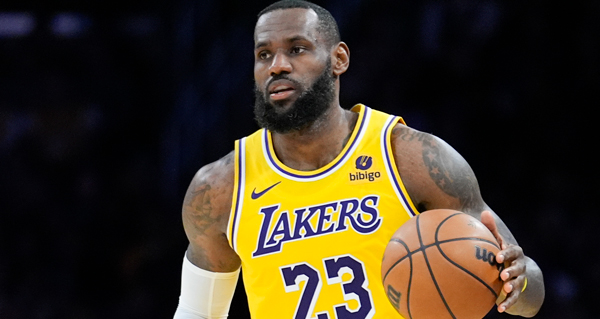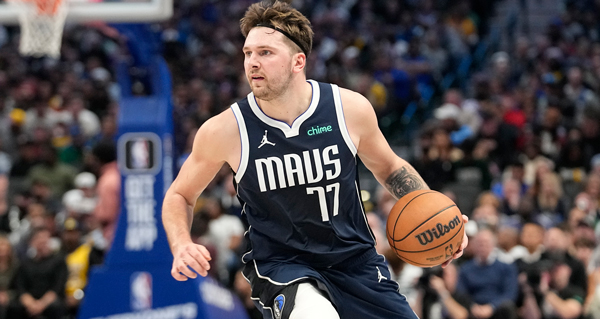I have already written twice about the Los Angeles Lakers’ trade for Luka Doncic. First about the trade signaling that the league’s new collective bargaining agreement has empowered owners and front offices after more than a decade of growing player power—then, about how the swap might play out on the court. The move is of a magnitude serious enough that writing about it once more feels warranted. In part three of three, the public’s reaction, and the concepts it stems from, will be considered.
It has been said, by many, that transactions like this never happen. And they don’t. A front-line star in the middle of his twenties simply isn’t traded unless he agitates for it, and does so with real leverage or a strong feel for chaos. That’s not what Doncic did. He was blindsided. Even as he was introduced as the next and future centerpiece of one of professional sports’ biggest global brands, he seemed emotionally shaky after the shocking deal. It will take some time for him to reclaim his sense of everything.
That Dallas Mavericks fans are incensed about the trade stands to reason. He’s their guy. There’s nothing better than drafting a star and watching him grow—all the better if he does it quickly, turning in iconic playoff moments as early as his second season. By his fourth season, he led you to the Conference Finals; by his sixth, one round further into the actual Finals. All this, on its own, is a Hall of Fame story. But to Mavericks fans, as recently as a week ago, it was perceived as mere prelude to what Luka would do in Dallas.
Okay. That hurt is obvious and relatable. But what of the outrage and pain of everyone else? Those who do not spend their basketball time rooting for the Mavericks? They, too, seem frazzled and angry that such a thing would happen; that it would even really be considered. The Superstar, they imply, has divine rights. And a front office that denies these privileges is thus depicted as hubristic, reckless, and villainous.
The Superstar, in general, represents a notion of individual greatness that is important to people. Basketball, more than any other mainstream team sport, consistently validates the thesis herein. One Guy is given credit, more often than not, for team success and championships. Last year, when the Boston Celtics won the title, many struggled to accept that theirs was more of an ensemble effort than we usually see, and made strained arguments for Jayson Tatum as that year’s MVP—ultimately, he finished sixth in voting.
No such complexity has existed in Luka’s career. Well-built as his Mavericks teams have been, there’s never been a question about who they rise and sink with. Every bit of success and failure has been anchored to the man they’ve built everything around, and his role on the court is so overwhelmingly central that we get to see more of his humanity than even the most visible of celebrity athletes usually show us. His joy, his malice, and his effort are all out there. Luka lives a whole life on the court.
And he lives it, often, in a way most of us wish we could. As he dismantled the Minnesota Timberwolves last May, he glared at heartbroken Minneapolis fans sitting courtside, and told them what’s what: “Who’s crying, motherf—er?” he asked one of them, exhibiting a level of competitive menace that evoked the last time he’d delivered this brand of post-season evisceration, against the Phoenix Suns two years previous. That was when he stared into Devin Booker’s soul, in the midst of a 33-point beatdown, and laughed.
If you’re like me, you might act this way at home, by yourself, watching a game—bragging your way through someone else’s accomplishments, letting your ego go on a fake little exhilarating ride. At best, you might talk this tier of shit from your own deeds in a video game you’re good at. The idea of a young man who boasts and gloats like this as he performs some of the hardest imaginable athletic feats, in front of tens of millions of people on TV, is so intoxicating that we don’t want him to answer to the decisions of an industrialist like Nico Harrison. The sport’s greatest cowboy is not supposed to be controlled by a calculating CEO. That’s not what we came here for.
The reasons offered for moving on from Doncic only reinforce this jilted feeling. Yes, Luka is overweight, relative to the bodily expectations of his sport. And if the rumors are true, he doesn’t condition like other NBA players do; the only exercise he gets, it’s been said, is by playing basketball. To Harrison and the rest of the Mavericks organization, this is cause for concern as the perennial MVP candidate gets older, but to everyone else, it only makes him more of a legend. Like Babe Ruth before him, he can amble into an arena out of sorts, out of shape, and inadequately prepared, but still put up historic numbers, while insulting everyone who doubted him. Why would you ever want to lose such deliriously fun dominance?
Maybe Dallas’ vision for the trade will end up exonerated, in some plain and objective basketball sense. That would be the case, arguably, if for the next several years, they’re better than the Lakers. But basketball fans will probably remain mad and unconvinced by what they did, regardless. That’s because Luka has meant something more than what wins and losses do. He is famous, himself, and alive in a way that is wholly original and that will likely prove timeless. Everyone wants a piece of the big tasty cultural thing that Luka is. That some dry and unlikeable franchise did not, and was greenlit to exert their control over Doncic’s fate, is the sin that will never be forgiven.




